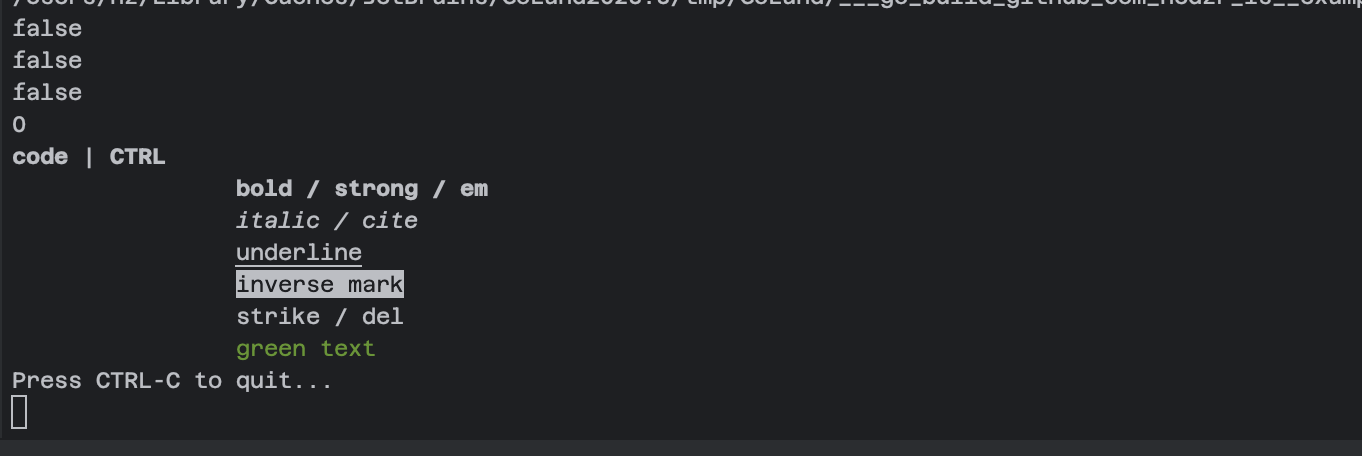Awesome
is
is provides numerous detectors for checking the states of environment (build, executive, ...).
Features
is.State(which) bool: the universal detector entry - viaRegisterStateGetter(state string, getter func() bool)to add your own ones. Since v0.5.11is.Env()holds a global struct for CLI app basic states, such as: verbose/quiet/debug/trace....DebugMode/DebugLevel,TraceMode/TraceLevel,ColorMode, ...
is.InDebugging() bool,is.InTesting() bool, andis.InTracing() bool, ....is.DebugBuild() bool.is.K8sBuild() bool,is.DockerBuild() bool, ....is.ColoredTty() bool, ....is.Color()to get an indexer for the functions in our term/color subpackage, ...- Terminal Colorizer, Detector, unescape tools.
- stringtool:
RandomStringPure, case-converters ... - basics: closable, closer, signals.
- easier
Press any key to exit...prompt:is.Signals().Catch()
- easier
- exec: Run, RunWithOutput, Sudo, ...
- go 1.22.7+ required
To using environment detecting utilities better and smoother, some terminal (and stringtool, basics) tools are bundled together.
Since v0.6.0, is.InDebugging() checks if the running process' parent is dlv.
The old DebugMode and DebugBuild are still work:
InDebugging: checks this process is being debugged bydlv.DebugBuild:-tags=delveis set at building.DebugMode:--debugis specified at command line.
Usages
package main
import (
"context"
"fmt"
"log/slog"
"os"
"sync"
"time"
"github.com/hedzr/is"
"github.com/hedzr/is/basics"
"github.com/hedzr/is/term/color"
)
func main() {
defer basics.Close()
is.RegisterStateGetter("custom", func() bool { return is.InVscodeTerminal() })
println(is.InTesting())
println(is.State("in-testing"))
println(is.State("custom")) // detects a state with custom detector
println(is.Env().GetDebugLevel())
if is.InDebugMode() {
slog.SetDefault(slog.New(slog.NewTextHandler(os.Stdout, &slog.HandlerOptions{AddSource: true, Level: slog.LevelDebug})))
}
// or:
// is.Color().GetColorTranslator().Translate("<b>bold</b>")
fmt.Printf("%v", color.GetCPT().Translate(`<code>code</code> | <kbd>CTRL</kbd>
<b>bold / strong / em</b>
<i>italic / cite</i>
<u>underline</u>
<mark>inverse mark</mark>
<del>strike / del </del>
<font color="green">green text</font>
`, color.FgDefault))
ctx, cancel := context.WithCancel(context.Background())
catcher := is.Signals().Catch()
catcher.
WithPrompt("Press CTRL-C to quit...").
WithOnLoop(dbStarter, cacheStarter, mqStarter).
WithOnSignalCaught(func(sig os.Signal, wg *sync.WaitGroup) {
println()
slog.Info("signal caught", "sig", sig)
cancel() // cancel user's loop, see Wait(...)
}).
Wait(func(stopChan chan<- os.Signal, wgDone *sync.WaitGroup) {
slog.Debug("entering looper's loop...")
go func() {
// to terminate this app after a while automatically:
time.Sleep(10 * time.Second)
stopChan <- os.Interrupt
}()
<-ctx.Done() // waiting until any os signal caught
wgDone.Done() // and complete myself
})
}
func dbStarter(stopChan chan<- os.Signal, wgDone *sync.WaitGroup) {
// initializing database connections...
// ...
wgDone.Done()
}
func cacheStarter(stopChan chan<- os.Signal, wgDone *sync.WaitGroup) {
// initializing redis cache connections...
// ...
wgDone.Done()
}
func mqStarter(stopChan chan<- os.Signal, wgDone *sync.WaitGroup) {
// initializing message queue connections...
// ...
wgDone.Done()
}
Result is similar with:

NOTE that is.Signals().Catch() will produce a prompt and enter a infinite loop to wait for user's keystroke pressed.
Lists
is.Terminal(os.Stdout)
The partials:
-
is.InDebugging / InDebugMode
-
is.DebuggerAttached (relyes on delve tag)
-
is.InTracing / InTestingT
-
is.InTesting / InTestingT
-
is.InDevelopingTime
-
is.InVscodeTerminal
-
is.InK8s
-
is.InIstio
-
is.InDocker / InDockerEnvSimple
-
Build
- is.K8sBuild
- is.IstioBuild
- is.DockerBuild
- is.VerboseBuild
- is.DebugBuild
- buildtags.IsBuildTagExists
-
States / Env
- VerboseModeEnabled
- GetVerboseLevel / SetVerboseMode / SetVerboseLevel
- QuietModeEnabled
- GetQuietLevel / SetQuietMode / SetQuietLevel
- NoColorMode
- GetNoColorLevel / SetNoColorMode / SetNoColorLevel
- DebugMode
- GetDebugLevel / SetDebugMode / SetDebugLevel
- Tracing
- TraceMode
- GetTraceLevel / SetTraceMode / SetTraceLevel
-
Terminal / Tty
- is.Terminal(file)
- is.TerminalFd(fd)
- is.Tty(wr)
- is.ColoredTty(wr)
- is.AnsiEscaped(s) (
IsTtyEscaped(s)) - StripEscapes(s)
- ReadPassword
- GetTtySize
- is.GetTtySizeByName(filename) (cols,rows,err)
- is.GetTtySizeByFile(file) (cols,rows,err)
- is.GetTtySizeByFd(fd) (cols,rows,err)
- StartupByDoubleClick() bool
-
[Special] Terminal / Color
- escaping tools: GetCPT()/GetCPTC()/GetCPTNC()
- Highlight, Dimf, Text, Dim, ToDim, ToHighlight, ToColor, ...
-
Basics
- closers
- Peripheral, Closable, Closer
- RegisterClosable
- RegisterClosers
- RegisterCloseFns
is.Signals().Catcher()- is.FileExists(filepath)
- is.ToBool, StringToBool
- closers
Build Tags
Some functions want special buildtags presented. These are including:
verbose: See VerboseBuild, ...delve: See DebugBuild, ...k8s: See K8sBuildistio: See IstioBuilddocker: See DockerBuild- ...
buildtags.IsBuildTagExists(tag) bool
Colorizes
The test codes:
import "github.com/hedzr/is/term/color"
func TestGetCPT(t *testing.T) {
t.Logf("%v", color.GetCPT().Translate(`<code>code</code> | <kbd>CTRL</kbd>
<b>bold / strong / em</b>
<i>italic / cite</i>
<u>underline</u>
<mark>inverse mark</mark>
<del>strike / del </del>
<font color="green">green text</font>
`, color.FgDefault))
}
Result:

And more:
func TestStripLeftTabs(t *testing.T) {
t.Logf("%v", color.StripLeftTabs(`
<code>code</code>
NC Cool
But it's tight.
Hold On!
Hurry Up.
`))
}
func TestStripHTMLTags(t *testing.T) {
t.Logf("%v", color.StripHTMLTags(`
<code>code</code>
NC Cool
But it's tight.
Hold On!
Hurry Up.
`))
}
Basics (Closers)
The Closers() collects all closable objects and allow shutting down them at once.
package main
import (
"os"
"github.com/hedzr/is/basics"
)
type redisHub struct{}
func (s *redisHub) Close() {
// close the connections to redis servers
println("redis connections closed")
}
func main() {
defer basics.Close()
tmpFile, _ := os.CreateTemp(os.TempDir(), "1*.log")
basics.RegisterClosers(tmpFile)
basics.RegisterCloseFn(func() {
// do some shutdown operations here
println("close single functor")
})
basics.RegisterPeripheral(&redisHub{})
}
Basics (Signals)
Signals() could catch OS signals and entering a infinite loop.
For example, a tcp server could be:
package main
import (
"context"
"os"
"sync"
"github.com/hedzr/go-socketlib/net"
"github.com/hedzr/is"
logz "github.com/hedzr/logg/slog"
)
func main() {
ctx, cancel := context.WithCancel(context.Background())
defer cancel()
logger := logz.New("new-dns")
server := net.NewServer(":7099",
net.WithServerOnListening(func(ss net.Server, l stdnet.Listener) {
go runClient(ctx, ss, l)
}),
net.WithServerLogger(logger.WithSkip(1)),
)
defer server.Close()
// make a catcher so that it can catch ths signals,
catcher := is.Signals().Catch()
catcher.
// WithVerboseFn(func(msg string, args ...any) {
// logz.WithSkip(2).Verbose(fmt.Sprintf("[verbose] %s", fmt.Sprintf(msg, args...)))
// }).
WithOnSignalCaught(func(sig os.Signal, wg *sync.WaitGroup) {
println()
logz.Debug("signal caught", "sig", sig)
if err := server.Shutdown(); err != nil {
logz.Error("server shutdown error", "err", err)
}
cancel()
}).
Wait(func(stopChan chan<- os.Signal, wgShutdown *sync.WaitGroup) {
logz.Debug("entering looper's loop...")
server.WithOnShutdown(func(err error, ss net.Server) { wgShutdown.Done() })
err := server.ListenAndServe(ctx, nil)
if err != nil {
logz.Fatal("server serve failed", "err", err)
}
})
}
func runClient(ctx context.Context, ss net.Server, l stdnet.Listener) {
c := net.NewClient()
if err := c.Dial("tcp", ":7099"); err != nil {
logz.Fatal("connecting to server failed", "err", err, "server-endpoint", ":7099")
}
logz.Info("[client] connected", "server.addr", c.RemoteAddr())
c.RunDemo(ctx)
}
some packages has stayed in progress so the above codes is just a skeleton (from go-socketlib/_examples/new-loop/main.go/v1).
Contributions
Kindly welcome, please issue me first for keeping this repo smaller.
License
under Apache 2.0



